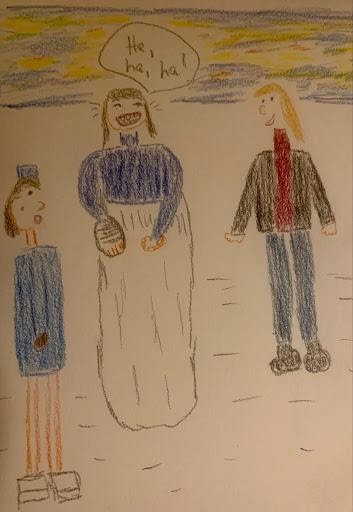The ER
Sue would see “Lincoln Park Hospital” on the caller ID and let it go to voicemail, and she did. Who knew if she was even still awake? I left a message, just for the simple fact that when you’ve been hit by a car, you should probably let somebody know.
It felt strange to be calling this late from a hospital two blocks from home. But if I were going to call anyone, there was nobody better than Sue, a friend who’d been there through everything since the age of 7. When I got pneumonia in fourth grade and missed three weeks of school, it was Sue who brought me up with a stack of People mags. On Pawleys Island, when I zoned out while reaching for the orange juice, it was Sue who ran for my dad on the beach.
Still, when she arrived at the hospital at nearly 1 a.m., I couldn’t fathom it. I couldn’t fathom much of anything, to be honest. I was still in shock. “Yucking it up with the nurses” is how Sue put it.
“Are you sure you were hit by a car?” she said. “You seem remarkably upbeat.”
She smiled in the way people smile at drunk friends, with eyebrows raised. And that made me laugh.
Lincoln Park Hospital had the kind of facilities you might see in the developing world. The emergency room was so small, you could see from one end of it to the other simply by walking in the door (or being wheeled in on a gurney for that matter). As I lay trembling in the ambulance, I’d begged the paramedics to take me to Northwestern Memorial, where my doctor worked. Instead, they took me here, a boxy, multi-story building on a dark corner.
If you were judging the place on looks alone, you might think substandard care was in your future. It was the kind of no-frills hospital that didn’t feel up to snuff, even if it was. I had no knowledge of its reputation. But as the daughter of a physician, I was used to having the best medical care — back home in Ohio. This, however, was Chicago.
Sue walked over to the cot. I was propped up there, my wrist wrapped in thick white gauze.
“Oh, look at your cheek,” she said.
“Is it swollen?”
“Yeah. Does it hurt?”
“It’s numb. You missed my call with Bridget. Would you believe she hung up on me?”
“Why?”
“I told her about the accident, that I couldn’t open at the store tomorrow.”
“And she hung up?”
“First she said, ‘Well who’s going to open with me, Beth?’ Just like that.”
“And she knew you were calling from the hospital?”
“Totally.”
“Girl, about that. You need a cell phone. If you’d had one, I would have answered.”
Truth was, a cell phone was an added expense. I was working from home mostly, as a freelance writer for Metromix.com. A land line was crucial to the job for an Internet connection, and who wants a second phone? Not me.
When I finally got rid of it, you would have thought I’d pawned an heirloom. Six months later, my parents were still on me to get a new one. I remember saying to them, “What’s so important that it can’t wait till I get home?”
That went over well.
And yet there was such freedom in running errands without interruption. As if time were my own. It was so nice to walk along the lakefront that summer and not feel beholden. I could focus my attention however I chose to, and that felt new.
“The way it went with Bridget, I’m not returning to my retail job,” I told Sue.
“Remember when the man asked if you would help put his pants on?”
“I told him I thought he could handle that all by himself.”
Time passed like this, the laughter emerging in sporadic bursts, until 2 a.m. That’s when the doctor confirmed the obvious. My wrist was broken.
I slept on Sue’s couch that night, the same one I’d watched Elf on hours earlier. It struck me how much had changed in the moments since then, and I wished I had just stayed put.



